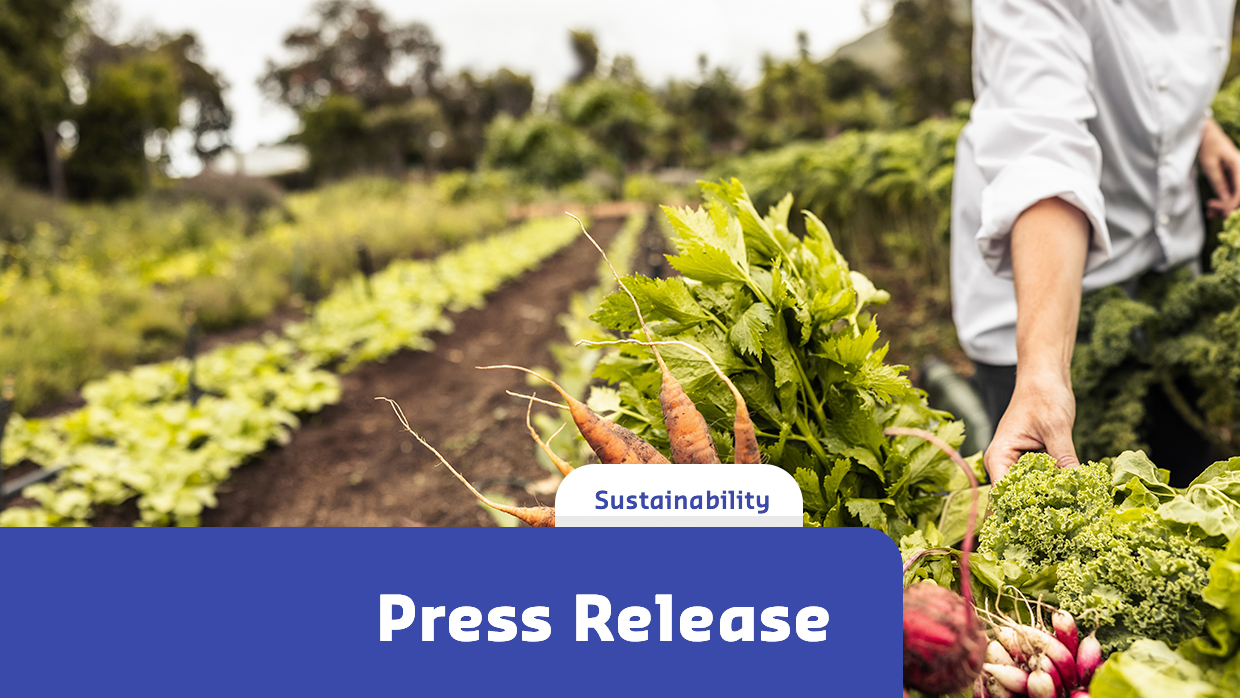Landmark Sodexo Study in College Dining Halls Shows Path for Plant-Based Meals Becoming the Norm

First-of-Its-Kind Study Led by Food for Climate League and Better Food Foundation Tests Plant-Based Defaults, With Dramatic Results
SAN DIEGO, Calif. (May 8, 2023) —In a first-of-its-kind study, Sodexo, one of the world's largest foodservice providers, identified a viable path toward achieving their ambitious climate commitments through a popular and cost-effective intervention: making plant-based meals the default. The study, led by Food for Climate League and the Better Food Foundation, found that switching from a meat-default to a plant-default led to 81% of students choosing plant-based meals and lowered greenhouse gas emissions by nearly 24%!
Through surveys, the study also confirmed a secondary benefit of serving plants-by-default. Students—including meat eaters—were significantly more likely to express satisfaction with plant-based meals on days when plant-based meals were the default. This suggests that in addition to influencing diners’ meal choices, the default also influences their attitudes about plant-based foods, and this normalizing of plant-based foods could make it easier for dining halls to expand their plant-based offerings more comprehensively.
This is great news for Sodexo, which has publicly committed to reducing its greenhouse gas emissions by making its college campus planned menus 50% plant-based by 2025.
Having plant-based foods isn’t a buzz or a trend, it’s a need and a demand that we deliver with creativity and flavor, Brett Ladd, CEO for the Sodexo US Campus division, said. We also recognize that reducing our animal-based food purchases is a key part of our carbon reduction strategy. Having the plant entrée as the default demonstrated that people are open to trying and enjoying plant-based options with the added benefit of helping the planet.
The three universities involved in the study include Tulane University in New Orleans, Lehigh University in Bethlehem, PA, and Rensselaer Polytechnic Institute in Troy, NY. The study is the first multi-university in-field experiment of default plant-based options within all-you-care-to-eat settings. The research team assessed one dining hall station containing eight pairs of dishes (one meat-based and one plant-based) throughout 35 lunch periods across three universities. On plant-default day, the plant-based dish was presented as the only option, though students could request the meat version if desired. On the control day, both meat and plant-based dishes were presented side-by-side.
The study assessed the impact of plant-based meals on the reduction of both emissions and the volume of animal-based meals served, as well as student attitudes towards plant-based dishes and their willingness to change their meat-eating habits. What they found was statistically astounding: A reduction in consumption of meat across two dining stations that implemented the plant-based default consistently across the study, from nearly 31% before the study to nearly 82% by the end of the study. The data supports past research showing choice architecture can be used to nudge people toward eating more plant-based foods.
Companies like Sodexo have made ambitious climate commitments that they can only achieve by serving more plant-based foods, Food for Climate League founder and Executive Director Eve Turow-Paul said. The challenge for foodservice leadership is how to make this shift while keeping students and staff satisfied. Behavioral nudges, including defaults, are a powerful addition to their toolkit for achieving this goal
This research demonstrates that by using emerging strategies like plant-based defaults, companies like Sodexo really can have their cake and eat it too—they can follow through on their climate commitments while also satisfying diners.
This study confirms what we've seen repeatedly—that Gen-Z students are not only open to plant-centered dining, but that they feel good about eating in places that center plant-based meals, Better Food Foundation Executive Director Jennifer Channin said. These findings give us hope that the plant-centered food system our world needs is easier to achieve than we used to think.
To learn more about the study or to schedule an interview with Better Food Foundation, Food for Climate League, or Sodexo contact jamie@betterfoodfoundation.org.
About Better Food Foundation
The Better Food Foundation (BFF) is an action tank that incubates novel strategies for diet change. BFF is both research-informed and action-driven, aims to accelerate the shifts to plant-centered eating that is already taking place in the world, and seeks to nudge people and institutions to adopt new norms where animal products are drastically reduced.
About Food for Climate League
FCL is a trailblazing, women-led 501c3 nonprofit working to make climate-smart eating the norm. FCL uses narrative and behavioral sciences to connect sustainable food culture to people's diverse needs, values, and cultures.
About Sodexo
Sodexo North America is part of a global, Fortune 500 company with a presence in 53 countries. Sodexo specializes in sustainable food and valued experiences at every moment in life: learn, work, heal and play. The company employs 94,000 people at thousands of sites in all 50 U.S. states, Canada, Puerto Rico and Guam, and indirectly supports more than 100,000 additional jobs through its annual purchases of $20B in goods and services from small to large businesses. Routinely recognized for the organization’s commitments to sustainability as well as diversity, equity and inclusion, Sodexo North America’s purpose is to create a better everyday for everyone to build a better life for all.